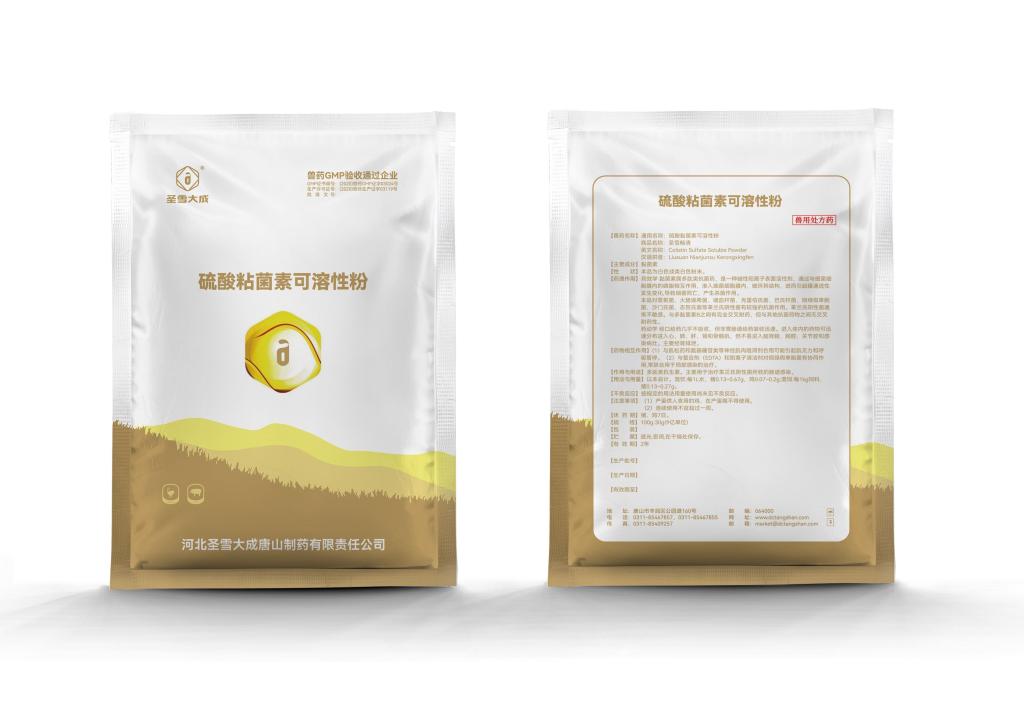Tel:+8618231198596

News
 CONTACT
CONTACT
 CONTACT
CONTACT
- Linkman:Linda Yao
- Tel: +8618231198596
- Email:linda.yao@dcpharma.cn
- Linkman:CHARLES.WANG
- Department:Overseas
- Tel: 0086 0311-85537378 0086 0311-85539701
News
Current Position:
Home >
News
>Livestock Resilience: Colistin Sulfate Soluble Powder's Impact on Herd Health.
Livestock Resilience: Colistin Sulfate Soluble Powder's Impact on Herd Health.
TIME:2024-01-24
I. Understanding Colistin Sulfate Soluble Powder
A. Colistin: An Antibiotic of Importance
Colistin is an antibiotic that belongs to the polymyxin class, known for its effectiveness against certain Gram-negative bacteria. Historically, colistin has been used in human medicine, but its importance in veterinary medicine has grown, especially in addressing bacterial infections in livestock.
B. Soluble Powder Formulation
Colistin sulfate soluble powder is a pharmaceutical formulation that allows for easy administration to livestock. This form is particularly suitable for inclusion in feed or drinking water, providing a convenient and effective means of delivering the antibiotic to the entire herd.
II. Applications in Livestock Health
A. Prevention and Treatment of Bacterial Infections
Colistin sulfate soluble powder is commonly employed for the prevention and treatment of bacterial infections in livestock. It is effective against a range of Gram-negative bacteria, including those that can cause respiratory, gastrointestinal, and systemic infections in cattle, swine, poultry, and other animals.
B. Respiratory Health in Poultry
In the poultry industry, respiratory infections can significantly impact flock health and productivity. Colistin sulfate soluble powder has been used to address conditions such as avian colibacillosis and pasteurellosis, helping poultry producers maintain the respiratory well-being of their flocks.
C. Enteric Health in Swine and Cattle
Livestock, particularly swine and cattle, are susceptible to enteric diseases caused by Gram-negative bacteria. Colistin sulfate soluble powder aids in preventing and managing conditions like colibacillosis and salmonellosis, contributing to the overall gastrointestinal health of the herd.
III. Benefits of Colistin Sulfate Soluble Powder in Livestock Resilience
A. Effective Bacterial Control
Colistin's mechanism of action involves disrupting the cell membranes of susceptible bacteria, leading to their death. This targeted action makes colistin sulfate soluble powder highly effective in controlling bacterial infections in livestock, contributing to improved overall health.
B. Convenience of Administration
The soluble powder formulation of colistin sulfate allows for easy and accurate administration to the entire herd. Producers can incorporate it into feed or drinking water, ensuring that each animal receives the appropriate dosage, simplifying the management of large groups of livestock.
C. Reduction in Economic Losses
Bacterial infections can result in significant economic losses for livestock producers due to reduced growth rates, decreased feed efficiency, and increased mortality. By preventing and treating infections, colistin sulfate soluble powder helps minimize these losses, supporting the economic sustainability of livestock farming.
IV. Challenges and Considerations
A. Antimicrobial Resistance Concerns
One of the primary challenges associated with the use of colistin in both human and veterinary medicine is the emergence of antimicrobial resistance. The overuse or misuse of colistin can contribute to the development of resistant bacterial strains, posing a threat to public health and the effectiveness of this important antibiotic.
B. Responsible Use Practices
To address concerns related to antimicrobial resistance, responsible use practices are crucial. Livestock producers and veterinarians must adhere to appropriate dosage regimens, avoid unnecessary use, and follow withdrawal periods to ensure that products like colistin sulfate soluble powder are used responsibly and in compliance with regulations.
V. Future Perspectives: Alternatives and Research
A. Exploration of Alternatives
Given the concerns surrounding antimicrobial resistance, there is an increasing emphasis on exploring alternatives to traditional antibiotics. Researchers are investigating novel approaches, including probiotics, prebiotics, phytogenics, and immunomodulators, to promote livestock health while minimizing the reliance on antibiotics like colistin.
B. Research on Antibiotic Alternatives
Ongoing research aims to identify and develop viable alternatives to antibiotics in livestock production. These alternatives may include substances that enhance the animals' immune responses, inhibit pathogen growth, or modify the microbial environment in the gastrointestinal tract.
VI. Ethical Considerations in Livestock Health
A. Animal Welfare and Responsible Antibiotic Use
Ethical considerations in livestock health extend beyond economic and production concerns to encompass the well-being of individual animals. Responsible antibiotic use involves prioritizing animal welfare, ensuring that treatments are administered judiciously, and adopting practices that minimize stress and discomfort for the animals.
B. Balancing Livestock Health and Public Health
The ethical considerations surrounding antibiotic use in livestock production also involve balancing the health of the animals with potential impacts on public health. As the global community addresses concerns about antimicrobial resistance, responsible use practices become integral to sustainable and ethical animal husbandry.
VII. Conclusion
Colistin sulfate soluble powder has become a valuable tool in promoting livestock resilience and addressing bacterial infections in the agricultural industry. Its applications in preventing and treating various Gram-negative bacterial infections contribute to the overall health and well-being of livestock. However, challenges associated with antimicrobial resistance highlight the need for responsible use practices and the exploration of alternative strategies to safeguard both animal and public health.
As the agricultural community continues to navigate the complexities of livestock health, it is essential to consider the broader implications of antibiotic use. Ethical considerations, responsible practices, and ongoing research into alternative approaches will shape the future of livestock health management. By embracing a holistic and sustainable approach, livestock producers can foster resilience in their herds while contributing to the global efforts to address the challenges associated with antibiotic use in agriculture.
- Tel:+8618231198596
- Whatsapp:18231198596
- Chat With Skype







